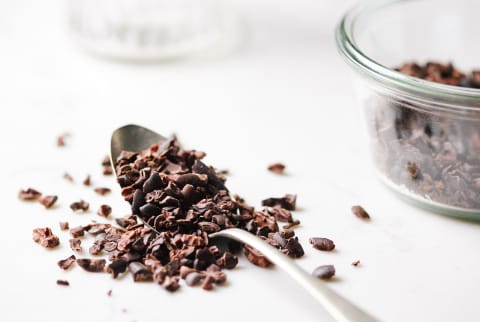Advertisement
Why Polyphenols Are So Good For Your Health + How To Get More In Your Diet


We’ve known for more than a hundred years that polyphenols (special compounds concentrated in plant leaves, fruits, and seeds), work as signaling agents, which act as mitochondrial protectants—but not in the way most people have been taught. These beneficial plant molecules are often celebrated for their antioxidant and anti-inflammatory properties. But, technically, they are not direct antioxidants or anti-inflammatory agents. So, what are the benefits of polyphenols, exactly? And how do we reap them?
Sources of polyphenols.
Polyphenols are found far and wide within the plant kingdom, but common foods that contain them include:
Basically, any dark or brightly colored plant-based food is likely to be chock-full of polyphenols. In general, organically grown plants tend to contain higher levels of polyphenols, too, as plant stressors (heat, drought, or nutrient deprivation) increases the polyphenol content. Multiple popular supplements, including grape seed extract, and pycnogenol (French maritime tree bark), also contain polyphenols.
Polyphenol subgroups
Most plant-based foods contain more than one type of polyphenol. In fact, there are a variety of different polyphenol subgroups that you may have heard about before, like these:
- Flavonoids (quercetin, anthocyanins, kaempferol, and catechins): found onions, dark chocolate, red cabbage, and tea, just to name a few.
- Phenolic acids, like stilbenes: found in many fruits and veggies.
- Lignans: found in flaxseeds and sesame seeds.
- Ellagic acid (sometimes converted to the active form urolithin): found in raspberries.
- Curcumin: found in turmeric.
It also bears mentioning that olives and olive oil are considered such great health foods, not only because of the monounsaturated fat and oleic acid, but because they, too, are chock-full of polyphenols. For example, the polyphenol hydroxytyrosol (HT), is considered one of the key factors responsible for the Mediterranean diet’s many health benefits. Research using olive oil extract has suggested that HT may prevent cardiovascular disease1, among others, by stimulating mitogenesis2 (i.e. making more mitochondria).
What do polyphenols do?
As mentioned in my book The Plant Paradox, plants use their polyphenols to protect their mitochondria from damage, particularly from sunlight. Notice the parallels here: plants need sunlight in order for their mitochondria to produce energy; humans need oxygen for the same purpose—yet both sunlight and oxygen are damaging to these organelles3.
So, how do plants mitigate this damage? By producing “sunscreens” (aka their polyphenols). And fun fact: the polyphenol content of a plant's leaves are usually much higher than the fruit.
Beyond their role in protecting plants, polyphenols also act as prebiotics—the compounds that encourage the growth of the good bacteria that live in your microbiome. There, they are consumed by those bacteria, then transformed into active postbiotic compounds.
You've likely been told, time and time again, that polyphenols have healthy-aging effects by way of fighting the free radicals that come from smoke, air pollution, and excess alcohol consumption. You may have also heard that they can encourage your blood vessels to remain flexible, keeping your blood pressure in a healthy range and reducing inflammation. And, of course, who can forget all the stories about how polyphenols control blood sugar levels and modulate insulin release4? I haven’t even gotten to the claims that polyphenols protect against Alzheimer’s, cognitive decline, and neurological inflammation5—nor that it prevents damage to cells. That’s quite a list, no?
In my experience, the tales are all true. Polyphenols are behind this list of "magical" benefits, but they don’t have much do with polyphenols acting as antioxidants.
How do we get the benefits of polyphenols?
How do they send these important signals, you might ask? Despite all the great health benefits linked to polyphenols, the truth of the matter is that most of these compounds are not readily bioavailable. Your small intestine—no matter how hard it may try—can only absorb about 10% of any polyphenol nutrients you consume. However, hope is not lost!
Unabsorbed polyphenols then accumulate in the large intestine where your probiotic bacteria (provided you have a healthy microbiome), use enzymes to chow down on those polyphenols and convert them into more absorbable forms. Your gut microbiome produces the actual compounds from polyphenols6 (postbiotics), that will tell your mitochondria to protect themselves.
So, when it comes to polyphenols: Eat them, swallow them, drink them moderately in red wine, coffee, or tea, and even use them topically on your face and skin. All in all, their health benefits can be astounding!

Steven Gundry, M.D., is a renowned heart surgeon, New York Times best-selling author, and medical researcher. Gundry graduated from Yale University with a B.A. in 1972 and went on to earn a medical degree from the Medical College of Georgia in 1977. He is the author of: Dr. Gundry’s Diet Evolution, The Plant Paradox, and The Plant Paradox Cookbook. His newest book, The Longevity Paradox, provides an innovative look at getting younger as we age, complete with an action plan to prevent and reverse disease and simple hacks to help anyone look and feel younger than their age.
Gundry is known as the leading expert on the lectin-free diet as the key to reversing disease and boosting longevity. He believes we have the ability to heal ourselves through nutrition when certain dietary obstacles are removed.
Gundry is currently the director of the International Heart and Lung Institute in Palm Springs, California, and the founder/director of The Center for Restorative Medicine in Palm Springs and Santa Barbara.
Learn more by listening to “The Dr. Gundry Podcast” available on iTunes, Stitcher and GooglePlay as well as your other favorite listening providers.
More from the author:
Functional Nutrition Training
Check out Functional Nutrition Coaching
A cutting-edge nutrition deep dive taught by 20+ top health & wellness experts
Learn moreMore from the author:
Functional Nutrition Training
Check out Functional Nutrition Coaching
A cutting-edge nutrition deep dive taught by 20+ top health & wellness experts
Learn more
Steven Gundry, M.D., is a renowned heart surgeon, New York Times best-selling author, and medical researcher. Gundry graduated from Yale University with a B.A. in 1972 and went on to earn a medical degree from the Medical College of Georgia in 1977. He is the author of: Dr. Gundry’s Diet Evolution, The Plant Paradox, and The Plant Paradox Cookbook. His newest book, The Longevity Paradox, provides an innovative look at getting younger as we age, complete with an action plan to prevent and reverse disease and simple hacks to help anyone look and feel younger than their age.
Gundry is known as the leading expert on the lectin-free diet as the key to reversing disease and boosting longevity. He believes we have the ability to heal ourselves through nutrition when certain dietary obstacles are removed.
Gundry is currently the director of the International Heart and Lung Institute in Palm Springs, California, and the founder/director of The Center for Restorative Medicine in Palm Springs and Santa Barbara.
Learn more by listening to “The Dr. Gundry Podcast” available on iTunes, Stitcher and GooglePlay as well as your other favorite listening providers.
6 Sources

Why Nutrition Is Key To Changing Your Relationship With Alcohol
Brooke Scheller, DCN, CNS

Why Alcohol Sabotages Your Gut Health & How To Get Back On Track
Brooke Scheller, DCN, CNS

Why Nutrition Is Key To Changing Your Relationship With Alcohol
Brooke Scheller, DCN, CNS

Why Alcohol Sabotages Your Gut Health & How To Get Back On Track
Brooke Scheller, DCN, CNS

Why Nutrition Is Key To Changing Your Relationship With Alcohol
Brooke Scheller, DCN, CNS

Why Alcohol Sabotages Your Gut Health & How To Get Back On Track
Brooke Scheller, DCN, CNS

Why Nutrition Is Key To Changing Your Relationship With Alcohol
Brooke Scheller, DCN, CNS

Why Alcohol Sabotages Your Gut Health & How To Get Back On Track
Brooke Scheller, DCN, CNS














